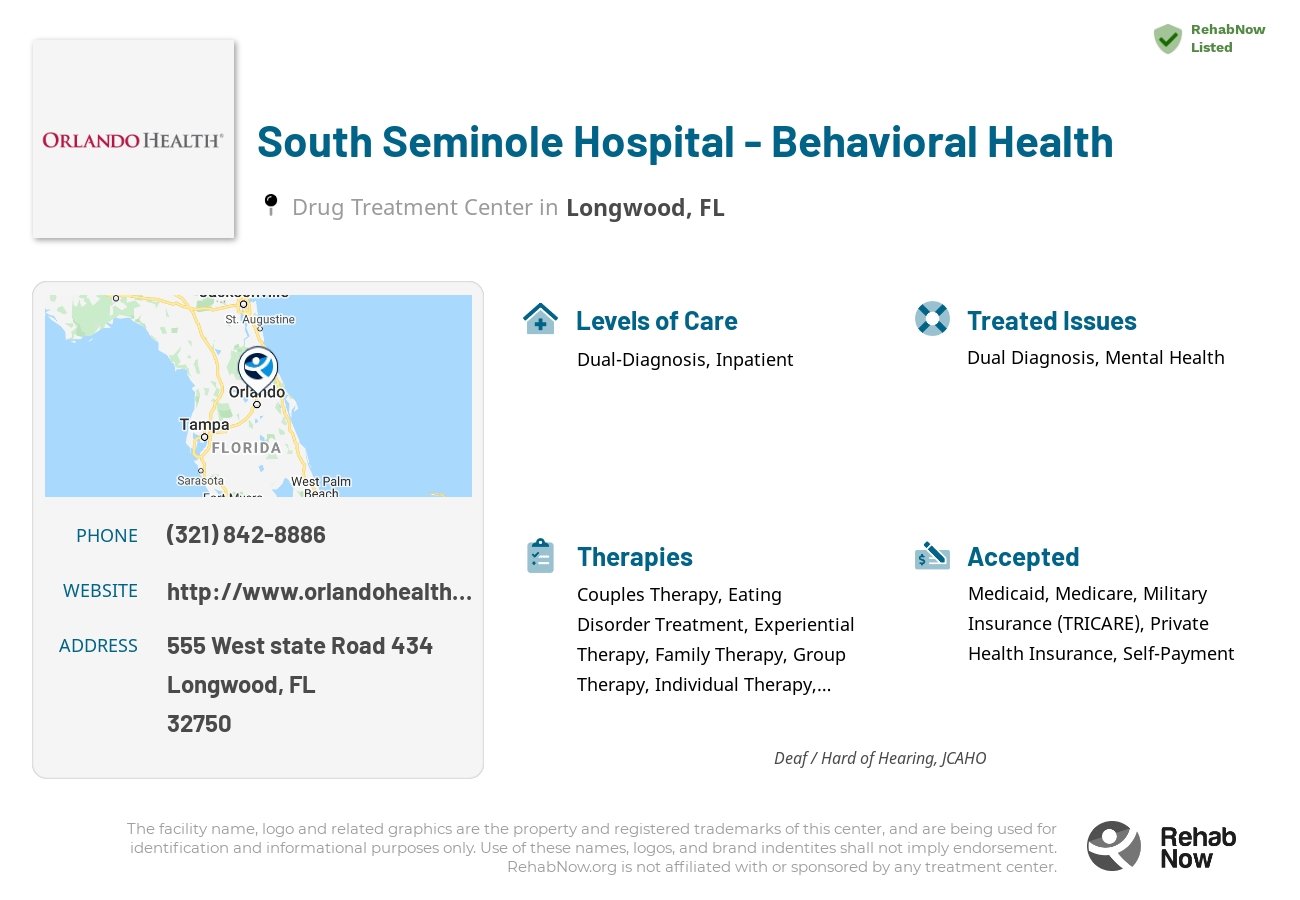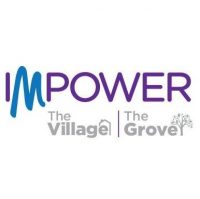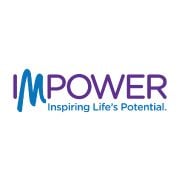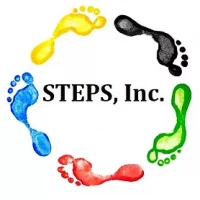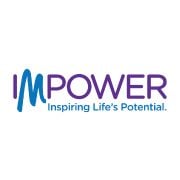South Seminole Hospital - Behavioral Health
Drug Rehab Center in Longwood, Florida
South Seminole Hospital - Behavioral Health is a JCAHO accredited Addiction Treatment Facility located in Longwood, FL that provides a complete continuum of care with Inpatient, Outpatient, and Dual-Diagnosis levels of care to meet the individualized needs of those suffering from addiction, eating disorder, mental health issues, drug dependency and alcoholism with 80 beds available and private health insurance plans accepted.
About South Seminole Hospital - Behavioral Health in Florida
South Seminole Hospital in Longwood, Florida, is dedicated to the comprehensive treatment of substance abuse and a broad spectrum of psychiatric conditions. It operates as an 80-bed psychiatric hospital, uniquely equipped to handle mental health challenges ranging from depression to addictive behaviors stemming from drug and alcohol misuse. Its approach integrates psychiatric evaluations with individualized therapy and family support, recognizing the interplay between mental health and addiction.
Accredited by JCAHO, South Seminole Hospital - Behavioral Health upholds high standards in patient care and safety. With a focus on treating dual diagnosis patients, the facility offers both inpatient and outpatient care. It's committed to facilitating long-term sobriety by concurrently addressing substance use disorders and mental health needs through a comprehensive range of therapies.
- Offers specialized treatment for dual diagnosis patients, emphasizing the critical relationship between mental health issues and substance abuse.
- Provides a comprehensive family involvement program, enhancing the recovery process and ensuring familial support.
- Holds JCAHO accreditation, guaranteeing adherence to the highest standards of patient safety and care effectiveness.
South Seminole Hospital caters to individuals fighting addiction or mental health issues like anxiety, depression, and more. By leveraging a mix of treatment methods, including individual, group, and family therapy, alongside pharmacological management, it offers a pathway to recovery tailored to the unique needs of each patient.
Genders
Ages
Modality
Additional
Accreditations

JCAHO
Conditions and Issues Treated
Substance abuse is the excessive use of any drug. This includes alcohol, medications, and illegal drugs. Substance abuse is treated with a combination of physical and mental treatments. Patients detox and follow up with therapies that target the underlying cause of the addiction. Substance abuse is a severe problem that can be successfully treated with a variety of therapies. South Seminole Hospital - Behavioral Health treatment uses a combination of therapies along with other resources to overcome substance abuse.
Levels of Care Offered
This center offers a variety of custom treatment tailored to individual recovery. Currently available are Dual-Diagnosis, Inpatient, Outpatient, with additional therapies available as listed below.
Inpatient treatment for alcoholism or drug addiction is an option that provides the addict with a supportive environment in which they can stop using. This type of treatment is appropriate for addicts that are most in need of intensive care and supervision. This includes those who were unable to quit on their own, those who need more structure than they can get in outpatient treatment.
“Outpatient treatment is ideal for those who have a lower intensity addiction. It’s also suitable for those with a supportive environment and those on a tight budget.
Outpatient treatment can be considered the lowest intensity level of addiction treatment. It is ideal for early phase addiction or lower intensity addictions. It may involve weekly sessions instead of daily. Peer group support, 12-step programs, and individual counseling may still be used and anti-addiction medication.
Therapies & Programs
No single treatment works for all addicts; therefore, the goal of treatment and therapy should be to find what works best for each individual. Some people requiring addiction treatment may only need a few weeks of inpatient care. Others will require long-term residential care. Tolerance and withdrawal levels vary from person to person and thus affect the intensity of the treatment needed.
If an individualized approach to treatment and therapy is not offered, addicts may fail to reap benefits from their efforts. Professionals must customize plans according to their patient’s needs, limitations, and strengths. The goal of all forms of addiction treatment should be for addicts to find healthy ways to cope with their addiction and its underlying causes.
Couples therapy for drug addiction is a unique form of therapy that allows family members to work through the emotional issues of their loved one’s addiction together. Family members can support each other while learning how to cope with the addiction and encourage healthy changes.
Accordingly, couples therapy for drug addiction is designed for an addict and their significant other or spouse. The two will work with a therapist to learn how the addiction affects themselves and the relationship and how to break the negative patterns of behavior that may have developed.
Drug addiction can destroy a person’s life, as well as their family and friends. The loss of one’s ability to choose how to live and behave often leads the addict into depression, anger, guilt, and many emotional problems.
The therapies usually include siblings, children, and parents who are involved in their daily lives. These sessions are vital because they address past issues that may have hampered an addict’s or alcoholic’s recovery and provide support at a crucial time!
One of the most critical aspects of family therapy is helping addicts’ loved ones see their situation in a new light. It’s also one of the most challenging things a family can do when a loved one struggles with addiction or alcoholism.
Group therapy is held in a safe, controlled setting where patients can feel comfortable sharing their struggles and gaining perspective through shared conversations. It takes place in a group rather than one on one to prevent feelings of isolation or being unique in their situation while creating an environment for addicts at South Seminole Hospital - Behavioral Health to develop fellowship, accountability, and support. Group therapy is an important tool in recovery that prevents cravings that prompt a return to active addiction.
This type of therapy involves the use of a variety of therapeutic techniques to help addicts recover from past traumas that might have triggered their substance abuse. During these sessions, therapists will work with the addict to address painful memories and learn how to cope effectively with stressors as they arise.
During these types of sessions, therapists will typically focus on three main goals:
- Identifying and expressing painful emotions associated with past traumas.
- Reducing the effects of stress on an addict’s life by developing more effective coping mechanisms.
- Developing healthy ways of thinking about stressful situations that can help addicts avoid substance abuse issues in the future.
This type of therapy is typically used in conjunction with other types of addiction treatment services. By identifying and dealing with the root cause of addiction, most addicts can overcome their cravings and prevent relapse once they leave rehab.
Many different types of addiction treatment services exist to help addicts safely get sober, but it’s important for recovering individuals to find a therapist or support group that will help them address the root cause of their addiction.
Cognitive-behavioral therapy is a talking-based method that helps people struggling with addiction replace destructive behaviors with healthier ones. CBT also helps them identify the underlying thoughts and beliefs that cause these behaviors in the first place and ways to control those thoughts and feelings. It can be administered as a holistic therapy or as part of combination therapy and—as opposed to turning to drugs and alcohol—helps addicts learn how to respond to negative thoughts instead.
When you leave a healthy lifestyle behind to live as an addict, your body becomes unbalanced. Nutritional deficiencies gradually creep in, and before you know it, you’re facing severe health problems. For people who are trying to kick their drug addiction, nutrition therapy at South Seminole Hospital - Behavioral Health is a great tool. It helps restore balance to the body, and for many addicts, it represents the first step on the road to recovery.
Nicotine replacement therapy is a way for people to get the nicotine they are addicted to without having to smoke cigarettes. There are several different types of devices that have been approved for NRT. Studies have shown that all NRTs work better than placebo (fake treatment). NRT helps smokers get nicotine into their system without resorting to smoking and experiencing aggressive withdrawal symptoms. Coupling NRT with counseling and other means of support gives long-term smokers a better chance of removing their unhealthy habit.
Patient Experience
Experiential Therapy at South Seminole Hospital - Behavioral Health
Experiential Therapy is used by drug treatment facilities to treat substance abuse. This treatment is clinically proven to help addicts in detoxification by allowing them to release emotions in a safe environment. The treatment process involves addicts painting their feelings and releasing them on a canvas.
One of the most popular forms of experiential therapy is known as LPE – Love, Peace, and Equilibrium. Amy Gumowitz developed this treatment in 1992. By implementing her philosophy of “reality therapy” into the treatment, Gumowitz’s results were outstanding. Once her success was validated by those she had been helping, she decided to open her treatment center. Although Gumowitz passed away in 2007, her contribution to the addiction recovery remains effective, and better yet, it is 100% self-sufficient.
Payment Options Accepted
For specific insurance or payment methods please contact us.
Is your insurance accepted?
Ask an expert, call (888) 674-0062
Additional Details
Specifics, location, and helpful extra information.
Longwood, Florida 32750 Phone Number(321) 842-8886 Meta DetailsUpdated April 15, 2024
Staff Verified
South Seminole Hospital - Behavioral Health Patient Reviews
There are no reviews yet. Be the first one to write one.
Longwood, Florida Addiction Information
Florida is one of the nation's epicenters for substance abuse and drug-related overdoses. In 2014, around 410,000 Florida residents were addicted to drugs and alcohol. Over the last 10 years, 12% of all deaths in the state were attributed to substance abuse. Treatment admissions for alcohol reached 24,329 patients in 2016, and 2.5% of Florida high school students admitted to using crack cocaine.
About 2,000 people in Longwood, FL are addicted to drugs. There were 398 opioid-related overdose deaths in Longwood, Florida, in 2016. Heroin-related deaths shot up by 50% in 2009. The most commonly abused drugs in Longwood include cocaine, heroin, marijuana, and methamphetamines. Many drug treatment options are available to get sober in Longwood. Inpatient rehab facilities offer a more immersive treatment experience while outpatient rehab facilities allow for more flexibility.
Treatment in Nearby Cities
- Jupiter, FL (144.3 mi.)
- Davie, FL (193.6 mi.)
- Yulee, FL (134.6 mi.)
- Avon Park, FL (76.9 mi.)
- Mulberry, FL (67.2 mi.)
Centers near South Seminole Hospital - Behavioral Health
The facility name, logo and brand are the property and registered trademarks of South Seminole Hospital - Behavioral Health, and are being used for identification and informational purposes only. Use of these names, logos and brands shall not imply endorsement. RehabNow.org is not affiliated with or sponsored by South Seminole Hospital - Behavioral Health.



